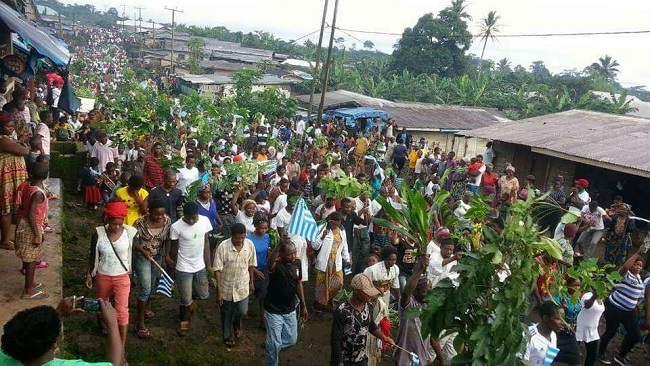Southern Cameroons: Francophone security forces opened fire on Anglophone protesters
Cameroon, the central African country that shares its western border with Nigeria, is reeling after major protests in its English-speaking regions on Sep. 22 ended with several protesters shot dead by security forces.
The protests took place as president Paul Biya addressed to the 72nd UN General Assembly, some 6,000 miles away in New York. Yet, the president, who’s speech bemoaned terrorism around the world and advocated peace at home, did not once mention the long-running crisis which has grounded courts and schools in the north west and south west regions since Nov. 2016. Biya also faced both Cameroonian protesters and supporters in New York,
Cameroon’s government is yet to comment on the shootings and the numbers of those killed are yet to be confirmed by any independent body. But local newspaper reports and eye witness accounts from different towns suggest at least five people were killed and many injured by security forces. The protests, which were marked by children, women, youths and elderly people across villages and towns in the English-speaking regions of Cameroon, caught most civil administrators off guard. It follows a recent spate of explosions in the troubled region. The bomb attacks which targeted security officials, damaged buildings in Limbe and Bamenda.

Cameroon’s current difficulties stem back to its pre-independence history when it was formed by combining a north-west and south-west region that was colonized by the British with the larger region run by the French. The country’s government, education, and legal systems are dominated by the larger French-speaking region. But in recent years tensions have mounted as people from the Anglophone regions have complained about being marginalized by the Francophone-led establishment. The Anglophone regions account for just under 20% of the Cameroon’s 23 million population.
Each side has accused the other of violent acts. Bernard Okalia Bilai, governor of the south west region told the state daily Cameroon Tribunethat protesters shot at the security forces in Mamfe, wounding a police officer. Two civilian deaths were also recorded in the town. Another protester was gunned down when they stormed the residence of the mayor of Buea, Ekema Patrick Esunge. Other deaths were reported in Limbe, Santa, Kumbo, Bamenda, Ekona, Bamenda and Ndop.

No individual or group has claimed responsibility for the bomb attacks. Though the Ambazonia Defense Forces, an armed group, claimed responsibility for an attack at a military facility in Mamfe. Government spokesman Issa Tchiroma Bakary has blamed the bombings on “terrorists” belonging to armed factions of secessionist movements.
Reeling from the deadly protest, activists are now looking forward to Oct. 1; the day Southern Cameroons got its independence from Britain in 1961. The Southern Cameroons Governing Council, an offshoot of the Southern Cameroons Ambazonia Consortium United Front, SCACUF, alongside secessionists taking abode abroad have been calling for Independence Day celebrations across the entire English-speaking regions.
Over the years, activists have struggled celebrating the day by hoisting blue-white flags of Ambazonia, the chosen name of an independent country. But such moves have often met with stiff resistance from the government.
Following last Friday’s large protests, which ended with more arrests, the national government has deployed contingents of armed police officers to forestall any popular uprising. A ban on the holding of public gathering has also been passed in some administrative units in the English-speaking regions. But in recent times, most reprisals have hardly deterred agitators.
Culled from Quartz





